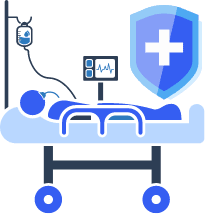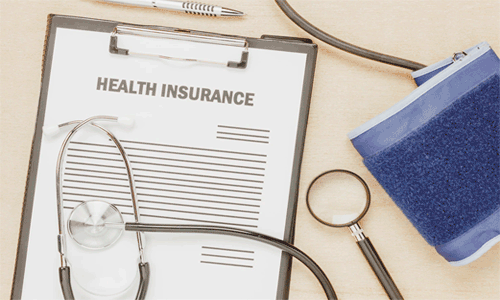- What is Cashless Hospitalisation?
- Different Types of Cashless Plans in UAE
- Benefits of Cashless Hospitalisation
- Difference Between Cashless and Reimbursement Claim
- Cashless Health Insurance During Planned Hospitalisation
- Eligibility Criteria for Cashless Hospitalisation
- Documents Required for Cashless Hospitalisation
- Top Reasons for Claim Rejection in a Cashless Mediclaim Policy
- How Can Policybazaar.ae Help You Choose a Cashless Health Insurance Policy?
- You May Also Know About Health guide:
Cashless Health Insurance In Dubai, UAE
Cashless health insurance, in particular, allows you to receive medical treatment without worrying about the costs — the insurance company directly pays the hospital. This method can significantly simplify the process for policyholders during stressful times.
In every insurance policy, the claim process is a critical component that should be smooth and simple. The health insurance claim process in the UAE generally falls into two categories — cashless and reimbursement. Each type is important for efficiently handling medical expenses.
Let's understand how cashless health insurance operates in the UAE and why it's a beneficial choice for policyholders.
What is Cashless Hospitalisation?
Cashless hospitalisation is a feature of health insurance plans where the insurer directly settles the medical bills with the hospital. This eliminates the need for you, the policyholder, to pay out of pocket at the time of treatment.
Let’s understand this better through an example —
- Policy Purchase: Amir gets a health insurance plan
- Unexpected Injury: He needs hospitalisation
- Network Hospital: He goes to a hospital that’s part of his insurer's network
- Cashless Claim: Amir presents health insurance card
- Claim Settlement: The hospital coordinates directly with the insurer and settles the bills
Here’s a further breakdown of the costs —
Suppose Amir’s health plan includes a deductible of AED 500 and a 20% copayment for the type of treatment received. In this case, he would pay the AED 500 deductible upfront if it hasn’t been met for the year, plus 20% of the remaining bill post-deductible. The insurance covers the rest up to the policy limits.
Different Types of Cashless Plans in UAE
Cashless insurance claim benefits are available through various types of health insurance plans.
Here’s an overview of some key types —
Comprehensive Health Insurance:
It provides extensive coverage including outpatient, inpatient, and (sometimes) even dental and optical care. This type of insurance is designed to cover a broad spectrum of medical services so that you get treatment without worrying about immediate payments.
Group Health Insurance:
Offered by employers, these plans cover all employees under a single policy. This insurance type is beneficial for companies as it usually involves lower premiums due to reduced risk. It offers the same cashless health insurance benefits across the board for all covered employees.
Senior Citizen Health Insurance:
Specifically tailored for those aged 60 and above, these plans often come with specialised benefits suited to older adults' needs. Although they may require a medical check-up before approval, such plans also offer cashless hospitalisation to ease the process for senior patients.
Domestic Worker Health Insurance:
In the UAE, there are specific plans designed to provide coverage for domestic workers. With these plans, domestic workers can also receive medical treatment without the necessity for out-of-pocket payments at the time of treatment.
Important
If you are covered under any of the health insurance plans and receive treatment at network hospitals, whether for planned or emergency care, you can avail of the cashless health insurance benefits.

Benefits of Cashless Hospitalisation
Here are the key advantages of cashless insurance that improve the healthcare experience for you —
- No Medical Billing Hassles: With cashless hospitalisation, there's no need to deal with the complexities of medical billing. The insurance company handles all hospital bills directly, which means you don't have to pay upfront and then wait for reimbursement. This removes a significant administrative burden from patients during tough times.
- Convenience: Cashless hospitalisation simplifies the logistics of receiving medical care. When you arrive at the hospital, you simply present your insurance card. The hospital coordinates directly with your insurance provider to settle the bills.
This process is possible only in network hospitals where the insurance company has pre-arranged agreements.
- Quality Healthcare at Preferred Hospitals: Many cashless health insurance plans have partnerships with a wide network of reputable hospitals. This confirms that policyholders have access to high-quality medical care.
Hospitals within the network are usually well-equipped and staffed with qualified medical professionals so that you receive the best possible care.
- Quick Claim Process: The cashless system speeds up the claims process. Since the hospital directly communicates with the insurance company, it often results in quicker claim approvals compared to the reimbursement method.
This efficiency is important in emergency situations where immediate medical attention is needed.
- Immediate Treatment: In emergencies, cashless insurance ensures immediate medical attention without the need for any deposit payments or financial guarantees. This can be essential in life-threatening situations where every second counts.
- Financial Relief: Cashless hospitalisation can provide significant financial relief during medical emergencies. It ensures that your savings are not drained by hospital bills as the insurer settles the costs directly.
Difference Between Cashless and Reimbursement Claim
The table below highlights the differences between cashless insurance and reimbursement health insurance —
|
Aspects |
Cashless Health Insurance |
Reimbursement Health Insurance |
|---|---|---|
|
Definition |
The insurer pays directly to the network hospital without any need to pay upfront |
You pay upfront for medical services and submit a claim to get reimbursed |
|
Claim Process |
Treatments are limited to network hospitals |
You can receive treatment at any hospital and submit bills to the insurer afterwards |
|
Settlement of Claims |
The insurer settles the bills directly with the hospital |
You pay initially. After you submit your claim, the insurer reimburses you. |
|
Approval Requirement |
Pre-approval needed before treatment (for planned treatments) |
Approval not required beforehand, although it's advisable to confirm coverage |
|
Documentation Required |
Minimal — usually just a pre-authorisation form and health insurance card |
Extensive documentation — including bills, medical reports, and claim forms |
Both types of claims offer unique advantages as per different needs and situations.
Cashless insurance claims provide a more seamless and hassle-free experience at the point of care, ideal for planned hospitalisations within the insurer's network. On the other hand, reimbursement claims offer more flexibility and are beneficial in situations where network hospitals are not accessible or preferred.
Cashless Health Insurance During Planned Hospitalisation
If, say, you are diagnosed with a condition like a hernia and your doctor advises you to undergo surgery, this is a usual case of planned hospitalisation.
In such scenarios, the cashless health insurance claim process involves several steps —
- Pre-Notification: Inform your insurer about the planned treatment. It's crucial to do this a few days before the hospitalisation — this will help the insurer prepare for your upcoming medical claim.
- Hospital Network: Make sure that the hospital you choose is part of your insurer's network. This is essential for availing of the cashless insurance facility.
- Documentation: At the hospital, you will need to present your health insurance card and a government-issued photo ID (or Emirates ID). The hospital’s insurance desk will provide a pre-authorisation form.
- Pre-Authorisation: Submit the filled pre-authorisation form along with any required medical documents back to the hospital’s insurance desk. The hospital will then send these documents to your insurer.
- Approval: Wait for your insurer to approve the treatment. Once approved, the insurer communicates directly with the hospital regarding the payment terms under the cashless claim.
- Treatment: Proceed with the surgery without any upfront payment. Your insurer settles the bills directly with the hospital.
- Follow-up and Discharge: After your treatment, finalise your paperwork. Check whether any necessary follow-up treatments or medications are clarified before discharge.

Eligibility Criteria for Cashless Hospitalisation
To be eligible for cashless hospitalisation, there are several key criteria that you must meet —
- Network Hospitals: You must receive treatment at a hospital that is part of your insurer's network to get cashless health insurance services.
- Policy Inclusion: The medical treatment you seek must be covered under your health insurance policy.
- Pre-Authorisation: For planned hospitalisations, you usually need to obtain pre-authorisation from your insurer before the treatment.
- Valid Insurance: Your health insurance must be active, with no premiums due.
- Identification: You will likely need to present your health insurance card and a valid form of ID at the hospital.
Documents Required for Cashless Hospitalisation
For cashless hospitalisation, the following documents are required to process your claim —
- Claim form that is duly filled and signed by the insured, indicating details like policy number, insured's name, and contact information
- Valid government-issued identification to verify your identity
- Physical or digital copy of the insurance policy card or certificate as proof of insurance coverage
- Written prescription from the treating doctor outlining the recommended treatment or medical procedure
- Relevant medical reports related to the diagnosis, medical history, and current condition
- An estimate of the expected treatment cost from the hospital may be required
- For follow-up treatments or chronic conditions, previous treatment records and history may be requested
- Depending on the specific circumstances, the insurance provider may request additional documents or information related to the claim
Top Reasons for Claim Rejection in a Cashless Mediclaim Policy
Here are some common reasons why cashless health insurance claims might get rejected —
- Non-Network Hospital: If the hospital where you receive treatment is not part of your insurance provider's network, your cashless claim could be rejected.
- Treatment Not Covered: Claims can be denied if the treatment you receive is not covered under your health insurance policy.
- Pre-existing Conditions: If you get treated for a pre-existing condition before the waiting period specified in your policy has passed, your cashless insurance claim will likely be rejected.
- Inaccurate Information: Providing incorrect personal details or failing to disclose relevant medical history can lead to claim denial.
- Exhausted Sum Insured: If you have already claimed up to the limit of your sum insured for the year, any additional claims may not be covered.
- Delayed Pre-Authorisation: Failing to get timely pre-authorisation for a procedure can result in a rejected claim.
To minimise the risk of rejection, it’s crucial to ensure that you
- Get treatment at a network hospital
- Fully understand the coverage and exclusions of your policy
- Submit accurate and complete information
- Follow all the procedural requirements for pre-authorisation and claim submission
How Can Policybazaar.ae Help You Choose a Cashless Health Insurance Policy?
Policybazaar.ae is an excellent platform for purchasing cashless health insurance in the UAE. It offers a range of plans from the top insurers in one place, which makes it easy for you to compare and choose.
Here’s how Policybazaar.ae can assist you in selecting the right cashless health insurance plan —
- Comprehensive Plan Comparisons: Policybazaar.ae lists health insurance plans from leading insurers in the UAE. It also provides a detailed comparison of features, benefits, inclusions, and exclusions.
This comprehensive overview helps you understand what each plan offers, including whether they provide cashless and reimbursement facilities.
- Easy Access to Information: On the official website of Policybazaar. UAE, you can easily go to the health insurance section, fill out a lead form, and be taken to a page with multiple health insurance quotes. With these simple steps, you can review various plans side by side.
- Customer Support: Policybazaar.ae provides top-notch customer support. By clicking on the apply button for a desired plan, you can get further assistance. Additionally, you can contact their customer care team for more personalised help.
In cashless claims, the insurance company pays the hospital directly for your medical expenses, provided the hospital is part of the insurer's network. In a reimbursement claim, you pay the hospital first and then claim reimbursement from your insurance provider.
Insurers provide a list of network hospitals on their websites or a directory with your policy documents. You can also call their customer service for up-to-date information.
Cashless hospitalisation can only be availed at network hospitals specified by your insurance provider. If the hospital is not part of the network, you will need to pay upfront and submit a reimbursement claim later.
If your cashless claim is rejected, you can file for reimbursement after paying the hospital bills. It’s important to collect and submit all necessary documents as specified by your insurance provider and inquire about the reason for rejection to avoid future issues.
Generally, the type of claim (cashless or reimbursement) is determined at the time of hospital admission. Switching from one to the other mid-treatment is not allowed unless under specific circumstances approved by the insurer.
Common reasons include seeking treatment at a non-network hospital, lack of pre-authorisation, discrepancies in the documents submitted, or the treatment not being covered under your policy terms.
The processing time can vary but generally, pre-authorisation for a cashless treatment is completed within a few hours to a couple of days. The actual timing depends on the urgency and the insurer's procedures.
You May Also Know About Health guide:
Health Insurance Popular Searches
Health Insurance | Health Insurance Cost in Dubai | Health Insurance for Kids | Family Health Insurance | Dental Insurance | Individual Health Insurance | Health Insurance Abu Dhabi | Medical Insurance Sharjah | How to check Medical Insurance status with Emirates ID | Best Medical Insurance in UAE | Health Insurance for Parents | Maternity Insurance UAE
More From Health Insurance
- Recent Articles
- Popular Articles















.png)















